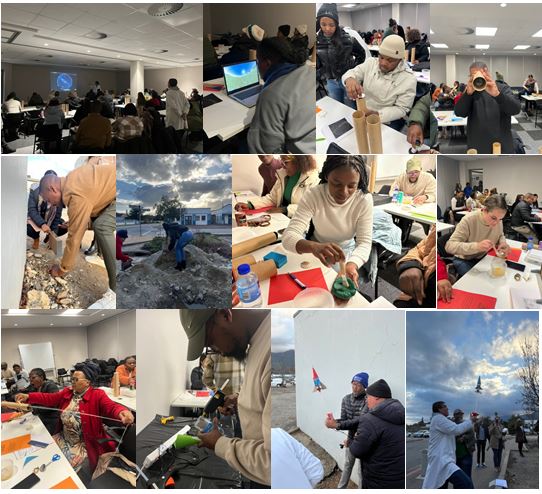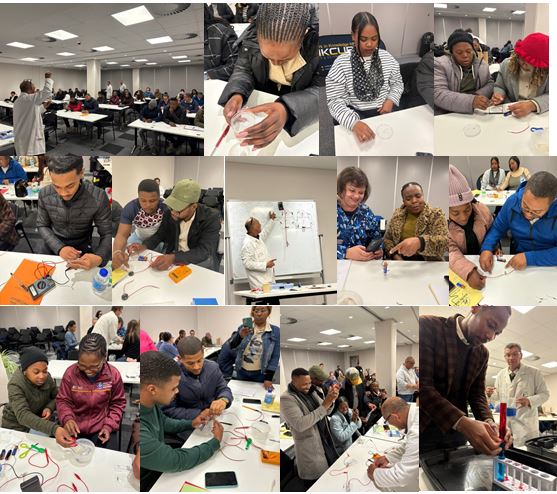Advancing Knowledge NPC (AK NPC) rounded off its 2025 training programme in inquiry-based STEM education training in George for grades 6-9 natural sciences and mathematics teachers that served to prepare teachers for the practical and experimental (inquiry-based) work to be completed during a particular school term. This project was a partnership between AK NPC and Inkcubeko Youth & Science Centre supported by the curriculum division of the WCED Eden and Central Karoo Education District.
The AK NPC programme had its opening 2-day training session in February 2025 for both natural sciences and mathematics – life sciences in natural science and whole numbers, fractions, integers and exponents in mathematics which form the part of curriculum content addressed in the first school term. On 11 and 12 April 2025 the second term content were addressed namely the chemistry component in natural sciences, and numeric and geometric patterns, functions and relations in grade 6-9 mathematics.
On 25 and 26 July, the last part of the 2025 natural science and mathematics programme was conducted at the conference venues of the Eden and Central Karoo Head Office in George. A total of 43 teachers attended the natural science session and 34 teachers participated in mathematics. The training approach adopted and agreed upon by the partnership is directed at providing teachers with inquiry skills to effectively allow learners to think practically about the two subjects. The head of the Inkcubeko Youth and Science Centre, Mr Innocent Ndlovu did the official welcoming while Prof Hartley, Director of AK NPC encouraged teachers to ensure that they inculcate the inquiry-based skills in their everyday lessons. The Eden & Central Karoo Education District was represented by subject advisors Mr Keenan Rasmus and Ms Memory Dhiza who motivated teachers to fully participate in the natural science and mathematics sessions respectively.
PLANET EARTH & BEYOND (ASTRONOMY) AS A FOCUS AREA OF THE NATURAL SCIENCE CURRICULUM
The astronomy session was conducted on Friday 25 July 2025 and facilitated by the effervescent Mark Ogilvie and Andrew Firth, a doctoral student in Astronomy. Facilitators were supported by AK NPC staff Saadiqah Fraden (science intern) and Melissa Petersen (Projects Coordinator). Teachers were guided through a journey that started on Planet Earth and included the various components of our solar system, the Milky Way and nearby galaxies in the universe. Teachers were provided with hands-on activities and teaching resources to determine, amongst others the phases and positions of the moon, the effect of the moon on tides and seasons, sedimentation rock formation on earth, developing pressurised rockets and Mars Rover activities. Software that provided teachers with detailed understanding of the planets in the solar system with content they could easily use in their lessons was loaded on their laptops. Teachers were constructively engaged through inquiry-based activities in a hands-on creative space provided by the facilitators. The interactive nature of the sessions were specifically developed to allow teachers to ask questions but also to be able to try the activities out on their own. Many teachers stayed behind to interact with the facilitators to further understand the application of the teaching resources so that they could apply it in their astronomy lessons.

ENERGY & CHANGE (PHYSICS) AS A FOCUS AREA OF NATURAL SCIENCE CURRICULUM
The energy and change session were conducted on Saturday 26 July 2025 and facilitated by the experienced Robert Solomon supported by the AK NPC staff. Teachers were guided from elementary experiments and investigative activities which they could directly apply in their energy and change lessons including developing a compass, energy transfers (convection, conduction and radiation), forces, electricity and electromagnetism. The application of everyday substances as teaching resources to illustrate the concepts, principles and theories in physics resonated with teachers as they keenly and enthusiastically participated in the practical activities of curriculum content. Teachers were provided with hands-on examples of readily available resources and alternative (to the textbook) ways of teaching energy changes (potential, kinetic, electrical) and forces including the aspects of forces that play a role in everyday life. Teachers were challenged with scenarios of cells and batteries, components of electric circuits where they had to draw circuits, build electric circuits, make predictions and test whether their predictions were correct.

APPLYING INQUIRY-BASED STRATEGIES IN THE TEACHING OF MATHEMATICS
The Mathematics course was conducted in parallel to natural science on 25 and 26 July 2025 by two experienced facilitators, Dr Victor Hess and Dr Clyde Felix supported by AK NPC staff. The course content covered for the third and fourth term of intersen phase included Geometry of straight lines and 2D shapes, transformation geometry, graphs, area and perimeter of 2D shapes, and surface area and volume of 3D objects. The facilitators went to great lengths to provide a safe and engaging environment in which teachers could present their approaches to teaching the above content and have a discussion of the inquiry-based strategies that could be applied as an alternative to consider. Facilitators worked within the teachers’ parameters of workload, time and class sizes to carefully craft inquiry-based approaches when engaging with the content. Each section of the term’s mathematics content were deliberated to allow teachers’ their perspectives on including inquiry skills into their lessons.
The following are some of the perceptions of natural science teachers expressed after the course:
- I really enjoyed this course on energy and change. I am currently teaching this part of the work and it came at the right time. The fact we could use products that is readily available helps a lot. I am glad I came to this course. [Teacher].
- Both sessions on astronomy and energy and change are very helpful as it gives me the confidence to do practical work with the learners. Nothing was scary about this course, we just learned, and learned and learned. I recorded all the practicals and will definitely implement it in my lessons. [Teacher]
- As a former biology teacher who is new to natural science, the course reminded of the importance of practical or inquiry teaching for our learners. I was pleasantly surprised by how the astronomy content can be tackled practically. Learners will definitely be impressed with the type of activities they will be doing in the last term [Teacher]
- I am encouraging teachers to make a start with the activities that they received here. Its more about getting learners excited and interested in science. [Science Subject Advisor].
The following are some of the reflections of mathematics teachers after the course:
- My colleagues and I found out about the course by accident. This was an important course for us as we could share some of our frustrations and learn from each other and the facilitators on how to tackle the maths content in our big classes. [Teacher]
- The course resolved some of my challenges in teaching the mathematics content. One thing I enjoyed was how to save some time to concentrate on those aspects of mathematics that continue from intermediate to senior up to FET phase. [Teacher]
- I initially indicated that I wanted to give up on teaching mathematics at my school. I have gained some belief back by our discussion of how to approach some of the content to allow learners to grasp the content better. These inquiry-based strategies are very interesting. [Teacher]
I am glad so many mathematics teachers heeded my request to attend the course. I listened to some of them and have a better understanding of the needs of teachers and to provide different strategies to make the work more interesting.